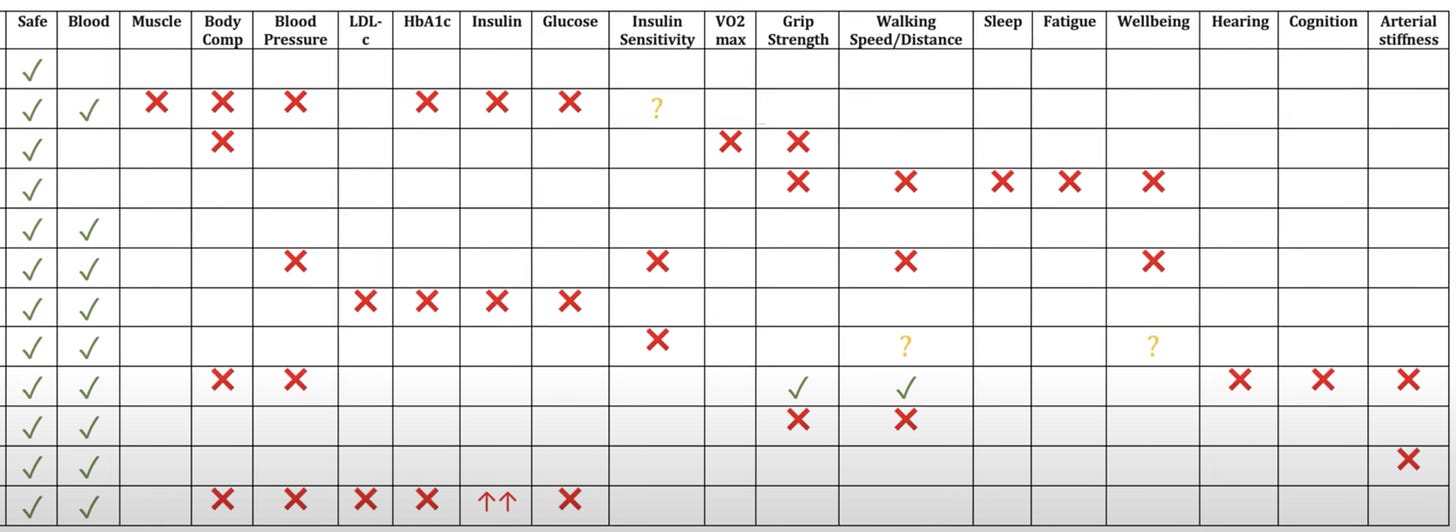The Supplement Trap: Why Longevity Seekers Should Think Twice
Unraveling the Science Behind Anti-Aging Claims and Finding Evidence-Based Alternatives
In recent years, the pursuit of longevity has led many health enthusiasts down a path lined with bottles of supplements. It's as if they're playing a game of "Gotta take them all!" – collecting pills and powders like rare Pokémon. But before you jump on this supplement bandwagon, it's crucial to understand the realities of the supplement industry and the science behind these popular products.
The Wild West of Supplements
In the United States, the supplement industry operates in a regulatory twilight zone. Unlike pharmaceuticals, dietary supplements don't require FDA approval before hitting the market. This lack of oversight means that companies can market their products with minimal evidence of efficacy or safety. Essentially, you could be swallowing hope in a capsule rather than a scientifically proven health booster.
Guidelines for Avoiding Ineffective Longevity Supplements
To protect yourself from wasting money and potentially harming your health with ineffective supplements, consider these guidelines:
1. Disregard Vermin Studies and Petri Dish Promises
Animal studies, particularly in mice and rats, often don't translate to human benefits. Even less reliable are petri dish studies, which observe effects in isolated cells under laboratory conditions. These studies, while useful for basic research, are far removed from the complex reality of the human body.
The "Look Back in Anger" manuscript from NIH1 highlights the limitations of relying on animal studies. This comprehensive analysis revealed a sobering statistic: only 1 in 20 mouse studies show a significant effect when translated to humans. This low rate of replication underscores the vast biological differences between humans and other mammals. Human longevity itself is an extreme outlier among mammals relative to our size, suggesting that the metabolic and cellular processes governing aging in humans may be uniquely regulated.
NMN (Nicotinamide Mononucleotide) shows how both animal and petri dish studies can mislead. Despite mouse studies and cell culture experiments implying that NMN could boost NAD+ levels could slow aging, human studies repeatedly show no benefit from NMN in humans. Dr. Brad Stanfield has tabulated the lack of effect in human studies2.
Many supplements follow this pattern: exciting results in petri dishes or animal models, followed by disappointment in human trials. Resveratrol3 and numerous antioxidants4 have shown similar trajectories.
Remember, your body is not a test tube or a mouse cage. The jump from laboratory to living person is enormous, and many promising compounds fail to make that leap successfully.
2. Look at all-cause impacts, including side effects
It's crucial to consider overall health impacts rather than focusing on narrow benefits. This includes not only the intended effects but also potential side effects and long-term consequences. All-cause mortality Hazard Ratios, or the chance of premature death, provide the most comprehensive view of an intervention's overall effect on health and lifespan.
Aspirin illustrates this principle well. Once touted as a wonder drug for heart health, a meta-analysis of over 150,000 participants found the cardiovascular benefits were not significant. Instead, it revealed increased risks of hemorrhagic stroke (19% increase) and major gastrointestinal bleeding (83% increase)5.
On the flip side, glucosamine shows positive all-cause mortality benefits, with a study of nearly half a million people in the UK finding a 15% lower risk of premature death among users. However, it's important to note potential side effects, such as increased intra-ocular eye pressure.
Rapamycin and metformin, both touted for potential life-extending properties, come with significant side effects that could offset their benefits, especially in healthy individuals. Rapamycin studies revealed side effects, including diarrhea (affecting 62% of participants in one trial), without showing other benefits in the reduction of frailty6.
Metformin, while potentially beneficial for diabetics, shows no significant longevity benefit for non-diabetics7.It can also lower testosterone levels8 and reduce the cardiorespiratory benefits of exercise by half in non-diabetic individuals9. These side effects could be counterproductive for those pursuing longevity through both supplementation and lifestyle changes.
Remember, supplements potent enough to have significant effects on your body are also potent enough to cause unwanted side effects. By considering all-cause impacts, we get a more complete picture of a supplement's true value and potential risks.
3. Discount studies funded by sellers
Be skeptical of research funded by companies with a financial interest in the results. The multivitamin industry provides a prime example. Despite years of industry-funded research suggesting widespread benefits, a 2024 study shows no reduction in premature death from daily multivitamins for anyone, not just those with healthy diets10.
Be wary of sellers engaging in special pleading - making excuses for why generic studies don't show benefits while claiming their specific product is different. For example, when studies showed no longevity benefit from resveratrol, GlaxoSmithKline claimed their version, SRT501, was a special formulation more potent than regular resveratrol. However, SRT501 also failed to show benefits in human trials. GlaxoSmithKline ultimately wrote off their $720m purchase of the resveratrol company as worthless11.
These arguments often create unfalsifiable claims: if the supplement doesn't work, it's because you're not using their special version. This is a red flag. Remember, if a supplement truly had significant longevity benefits, this would likely be reflected in large-scale, independent studies - which is rarely the case.
Conclusion
The allure of a longevity-boosting pill is strong, but evidence suggests most supplements fall short of their claims. The supplement industry's lack of regulation, combined with the complexities of human biology, makes finding truly effective longevity supplements challenging.
Instead of collecting supplements like Pokémon, focus on proven lifestyle factors that promote longevity: a healthy diet, consistent exercise, and longevity habits. Your journey to a longer, healthier life is more likely to succeed when built on these fundamental pillars rather than on unproven supplements.
Remember, there's no magic pill for longevity. The best "supplement" is a daily dose of healthy habits and skepticism towards overblown health claims. By applying the guidelines discussed in this article, you can make more informed decisions about your health and longevity.
Ready to Hack Your Lifestyle and Live Longer? Subscribe Now and start your journey to a longer, healthier life!
Discover your true biological age with our FREE Longevity Calculator and unlock personalized biohacks to optimize your health and well-being.




